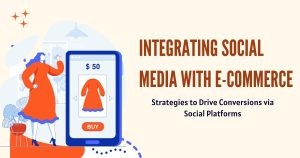What is E-commerce Marketing? A Complete Guide for Beginners

E-commerce marketing has become an important strategy for companies flourishing in online marketplace. Whether you are a budding entrepreneur or an experienced marketing personnel, the basic and complexity of e-commerce marketing can help you develop, attract customers and increase sales.
What is E-commerce Marketing?
E-commerce marketing is the process of marketing online stores to attract possible customers and lead them down sales tracts, ranging from creating quarrels and changing the management of loyal buyers. It combines various digital marketing strategies, such as search engine optimization (SEO), marketing on social media, paid advertising, e -post campaign and more, especially sewn for online stores.
Unlike traditional marketing, e-commerce marketing is run especially in digital space, which makes it important for companies to understand behavior, preferences and need for an online store. A well-designed marketing strategy for e-commerce requires how you can get in touch with the right audience, show products effectively and adapt the experience of buying.
Why is E-commerce Marketing Important?
The e-commerce space is growing fast. According to Statista, global e-commerce sales are projected to hit $6.3 trillion by 2024. For businesses, this means more opportunities but also more competition. Here’s why e-commerce marketing is essential:
- Reach a Broader Audience
Online marketing allows businesses to target customers from around the world, breaking geographical limitations.
- Increase Sales and Revenue
Effective e-commerce marketing strategies help drive traffic and convert visitors into paying customers.
- Enhance Brand Visibility
With the right marketing tactics, you can boost your online brand presence and stand out in a competitive market.
- Build Customer Loyalty
Marketing tactics like email campaigns and loyalty programs help businesses retain customers by nurturing long-term relationships.
By adopting a strategic e-commerce marketing plan, you ensure your business stays relevant and competitive in an increasingly digital-first retail landscape.
Key Elements of E-commerce Marketing

Building a successful e-commerce marketing plan requires a mix of strategies tailored to engage and convert your audience. Here’s a breakdown of essential elements:
1. Search Engine Optimization (SEO)
SEO is the backbone of any e-commerce marketing strategy. It ensures your online store ranks high on search engines, making it easier for customers to find you.
- Use targeted keywords in key places like product titles, descriptions, and category pages.
- Ensure your website is mobile-friendly and has fast loading times.
- Optimize product pages with clear descriptions, high-quality images, and reviews.
2. Content Marketing
Content Marketing is king in the online world. By providing valuable and engaging content, you can attract and retain customers.
Examples of content marketing in e-commerce include:
- Product tutorials or “how-to” guides.
- Blog posts that discuss industry trends or customer pain points.
- Creative videos highlighting product benefits.
3. Email Marketing
Email marketing has one of the highest returns on investment, with some studies estimating an ROI of $36 for every dollar spent. It’s one of the best ways to build lasting relationships with your customers.
Effective email campaigns include:
- Welcome emails for new subscribers.
- Abandoned cart reminders to bring back potential buyers.
- Personalized offers based on customer purchase history.
4. Social Media Marketing
Platforms like Instagram, Facebook, and TikTok are crucial for showcasing e-commerce products and engaging with customers.
Here’s how to use social media effectively:
- Share high-quality images and videos of your products.
- Run engaging campaigns, like giveaways or user-generated content challenges.
- Take advantage of shoppable posts that allow users to buy directly through social platforms.
5. Paid Advertising
Pay-per-click (PPC) ads, such as Google Ads and social media advertisements, allow e-commerce businesses to promote products to specific audiences.
- Use Google Shopping ads to appear on SERPs with product details and prices.
- Target specific audiences on platforms like Facebook and Instagram with custom ads.
6. Affiliate and Influencer Marketing
Partnering with affiliates marketing or influencers leverages their audience and credibility to promote your products.
- Affiliate Marketing involves working with websites or bloggers who earn a commission for driving sales.
- Influencer Marketing leverages social media personalities to recommend your products to their followers.
How to Create an Effective E-commerce Marketing Strategy
To maximize your business’s potential, follow these steps to develop a winning e-commerce marketing plan:
- Define Your Target Audience
Research your ideal customer and create buyer personas that include demographics, interests, and shopping behaviors.
- Set Clear Goals
What do you aim to achieve? Whether it’s increasing sales, improving customer retention, or boosting brand awareness, define measurable objectives.
- Choose the Right Channels
Not every channel will be effective for your business. Focus on platforms where your target audience is most active.
- Track and Analyze Metrics
Use tools like Google Analytics to monitor traffic, conversion rates, and customer behavior. Adjust your strategy based on performance data.
The Role of Technology in E-commerce Marketing

Advanced equipment and platforms allow businesses to perform and manage marketing strategies effectively. Platforms such as Shopify, WooCommerce and BigCommerce simplify the e-commerce process and integrate with marketing tools such as MailChimp or Google Advertising.
In addition, analyzes and AI tools can help you predict customer experiences and predict behavior, giving you a competitive advantage.
Take Your E-commerce Marketing to the Next Level
E-commerce marketing is not a size-pass-all solution. This requires creativity, stability and an analog approach to meet the needs of your business and the audience.
Whether you just start an online store or want to customize your existing, you will use these strategies help you attract customers, convert management and build a wealthy online business.
The e-commerce industry continues to develop, and it is important to succeed at the top of the latest marketing trends. Eager about how to adapt your e-commerce store further? Explore our free marketing guides and unlock more tips to market conversions!





